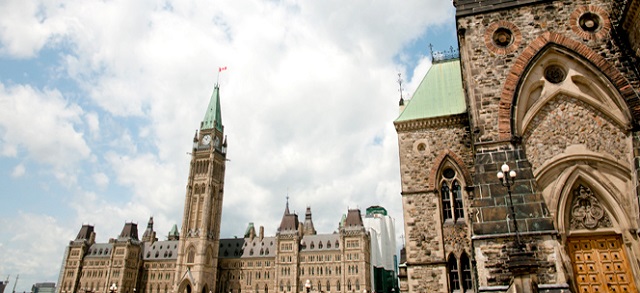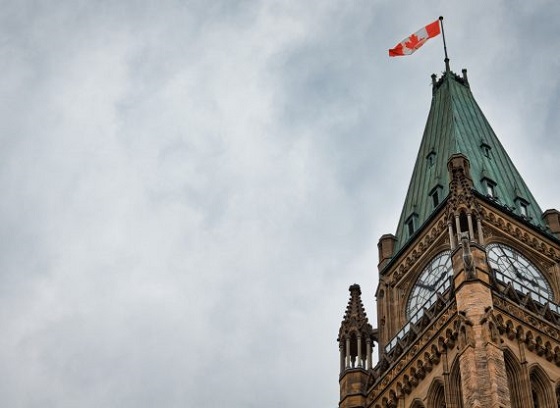Economy
Canadians think Canada is ‘broken’ amid gloomy economic numbers

From the Fraser Institute
Approximately three years have passed since the end of the initial phase of the COVID pandemic that saw large swathes of the economy shuttered for most of the 2020-2021 period. And it’s almost nine years since the 2015 federal election, which resulted in a majority government for Justin Trudeau’s Liberals. So, it’s a good time to do a pulse check on Canadians to see how they’re faring and feeling about the country.
Overall, the news isn’t particularly cheerful, on either front.
Dealing first with economic prosperity, the big story is that Canada’s population has been growing faster than the volume of output produced by the economy (defined as gross domestic product, adjusted for inflation). This means the economy has been shrinking on a per-person basis, prompting some analysts to coin the term “per-person recession” to describe the performance of Canada’s economy since 2022.
The trend has been stark in the last two years, but it started earlier. The absolute level of per-person output is smaller today than in 2018 in seven of 10 provinces including Ontario. More importantly, income and earnings growth has been essentially stagnant for most Canadians over roughly the last decade. Canada has also fallen further behind the best-performing advanced economies on productivity, per-person income and real wages.
What about public attitudes? A recent Ipsos survey finds 70 per cent of Canadians think the country is “broken,” an opinion especially common among young adults. Older Canadians have a more positive view of things. A Statistics Canada survey shows a significant drop in the percentage of Canadians reporting high levels of “life satisfaction.” The same survey shows that 40 per cent of respondents between the ages of 25 and 54 say it’s difficult to meet their financial needs.
The shock delivered by the recent bout of high inflation no doubt has contributed to this gloomy assessment. And it doesn’t help the public mood that housing has never been less affordable, that crime is on the rise, and that basic health-care services are harder to access than they were five or 10 years ago.
Other data paint a more nuanced picture of how Canada is doing. The Organization for Economic Cooperation and Development (OECD)—a collection of mostly rich countries—publishes a “Better Life Index,” which aims to gauge overall citizen wellbeing. In the most recent iteration of the Index, Canada beats the OECD average on income, employment levels, education attainment, life expectancy at birth, and environmental quality, among other indicators. Our relative ranking has slipped in some areas—a worrisome sign—but overall, Canada puts up a decent score.
Still, stagnant real incomes and an economy that’s expanding more slowly than the population is not an ideal place to land. To do better, Canada will need at least a few years of stronger per-person economic growth. This will require a turnaround in our notably lacklustre productivity record and a sustained pick-up in business investment. Revisiting the federal government’s ambitious immigration targets may also be necessary, as Trudeau government ministers have publicly (albeit somewhat sheepishly) acknowledged.
Getting the economic fundamentals right is essential to making progress on most economic and social indicators. As the OECD notes, “while money may not buy happiness, it is an important means to achieving higher living standards and thus greater well-being.”
Author:
Daily Caller
UN Chief Rages Against Dying Of Climate Alarm Light


From the Daily Caller News Foundation
The light of the global climate alarm movement has faded throughout 2025, as even narrative-pushing luminaries like Bill Gates have begun admitting. But that doesn’t mean the bitter clingers to the net-zero by 2050 dogma will go away quietly. No one serves more ably as the poster child of this resistance to reality than U.N. chief Antonio Guterres, who is preparing to host the UN’s annual climate conference, COP30, in Brazil on Nov. 10.
In a speech on Monday, Guterres echoed poet Dylan Thomas’s advice to aging men and women in his famed poem, “Do not go gentle into that good night:”
Do not go gentle into that good night,
Old age should burn and rave at close of day;
Rage, rage against the dying of the light.
Dear Readers:
As a nonprofit, we are dependent on the generosity of our readers.
Please consider making a small donation of any amount here.
Thank you!
Though wise men at their end know dark is right,
Because their words had forked no lightning they
Do not go gentle into that good night.
Seeing that his own words have “forked no lightning,” Guterres raged, raged against the dying of the climate alarm light.
“Governments must arrive at the upcoming COP30 meeting in Brazil with concrete plans to slash their own emissions over the next decade while also delivering climate justice to those on the front lines of a crisis they did little to cause,” Guterres demanded, adding, “Just look at Jamaica.”
Yes, because, as everyone must assuredly know, the Earth has never produced major hurricanes in the past, so it must be the all-powerful climate change bogeyman that produced this major storm at the end of an unusually slow Atlantic hurricane season.
Actually, Guterres’ order to all national governments to arrive in Belem, Brazil outfitted with aspirational plans to meet the net-zero illusion, which everyone knows can and will never be met, helps explain why President Donald Trump will not be sending an official U.S. delegation. Trump has repeatedly made clear – most recently during his September speech before the U.N. General Assembly – that he views the entire climate change agenda as a huge scam. Why waste taxpayer money in pursuit of a fantasy when he’s had so much success pursuing a more productive agenda via direct negotiations with national leaders around the world?
“The Green New Scam would have killed America if President Trump had not been elected to implement his commonsense energy agenda…focused on utilizing the liquid gold under our feet to strengthen our grid stability and drive down costs for American families and businesses,” Taylor Rogers, a White House spokeswoman, said in a statement to the Guardian. “President Trump will not jeopardize our country’s economic and national security to pursue vague climate goals that are killing other countries,” she added.
The Guardian claims that Rogers’s use of the word “scam” refers to the Green New Deal policies pursued by Joe Biden. But that’s only part of it: The President views the entire net-zero project as a global scam designed to support a variety of wealth redistribution schemes and give momentum to the increasingly authoritarian forms of government we currently see cracking down in formerly free democracies like the U.K., Canada, Germany, France, Australia and other western developed nations.
Trump’s focused efforts on reversing vast swaths of Biden’s destructive agenda is undoing 16 years of command-and-control regulatory schemes implemented by the federal government. The resulting elimination of Inflation Reduction Act subsidies is already slowing the growth of the electric vehicles industry and impacting the rise of wind and solar generation as well.
But the impacts are international, too, as developing nations across the world shift direction to be able to do business with the world’s most powerful economy and developed nations in Europe and elsewhere grudgingly strive to remain competitive. Gates provided a clear wake-up call highlighting this global trend with his sudden departure from climate alarmist orthodoxy and its dogmatic narratives with his shift in rhetoric and planned investments laid out in last week’s long blog post.
Guterres, as the titular leader of the climate movement’s center of globalist messaging, sees his perch under assault and responded with a rhetorical effort to reassert his authority. We can expect the secretary general to keep raging as his influence wanes and he is replaced by someone whose own words might fork some lightning.
David Blackmon is an energy writer and consultant based in Texas. He spent 40 years in the oil and gas business, where he specialized in public policy and communications.
Business
The Liberal budget is a massive FAILURE: Former Liberal Cabinet Member Dan McTeague

Prime Minister Mark Carney tabled his government’s long-overdue budget yesterday and took the same approach as his predecessor – spend, spend, spend.
Canada’s deficit is now a staggering $78 BILLION. To make matters worse, Carney doubled down on the industrial carbon tax.
Dan McTeague explains in his latest video.
-

 Agriculture2 days ago
Agriculture2 days agoDanish Cows Collapsing Under Mandatory Methane-Reducing Additive
-

 Alberta2 days ago
Alberta2 days agoAlberta government’s plan will improve access to MRIs and CT scans
-

 Business2 days ago
Business2 days agoNo Jobs Clause: Liberals Under Fire Over Stellantis Deal in Fiery Committee Showdown
-

 Economy2 days ago
Economy2 days agoWelcome to the Energy Humanist Club! Bill Gates breaks the moral monopoly against fossil fuels
-

 Business1 day ago
Business1 day agoBudget 2025 continues to balloon spending and debt
-

 Censorship Industrial Complex1 day ago
Censorship Industrial Complex1 day agoHow the UK and Canada Are Leading the West’s Descent into Digital Authoritarianism
-

 Business2 days ago
Business2 days agoFederal budget: Carney government posts largest deficit in Canadian history outside pandemic
-

 Business1 day ago
Business1 day agoCapital Flight Signals No Confidence In Carney’s Agenda








